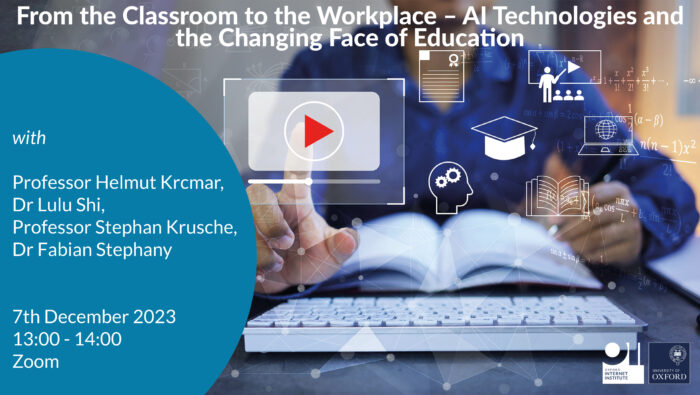
Dr Fabian Stephany
Departmental Research Lecturer
Fabian is a Departmental Research Lecturer in AI & Work at the Oxford Internet Institute.

As artificial intelligence (AI) transforms the world of work, it has also emerged as a powerful force for change within the field of education, with the capacity to personalize learning experiences, cater to diverse student needs, and enhance overall educational outcomes.
At the same time, educational experts point to an array of potential harms that could be driven by the use, or improper use, of AI in education. These include concerns about cheating and dishonesty, the impact of algorithmic bias, and issues around privacy and data protection. It is clear that the future of AI in education will require careful consideration of both the risks and benefits of these technologies.
In this context, it is important to recognize that these questions and concerns are not experienced in the same ways across different stages of education. The three speakers in this webinar present their insights into how AI technologies are changing teaching and learning practices, not just in relation to the tools used, but in the skills that are taught.
Dr Lulu Shi – The Future of Education – Understanding how technology transforms education
Technology is often portrayed as the future of education, promising personalised teaching, objective assessment, and equal access. Yet, education technology (EdTech) providers are overwhelmingly for-profit businesses and not institutions with education as their core mandate. With education increasingly mediated through technology, teaching format, communication channels, and classroom curriculum are progressively shaped by technological tools and infrastructure.
A close inspection of the products and services offered by EdTech companies as well as their target groups is needed to understand how digital technology may impact classroom dynamics and transform education. This study has developed the first EdTech usage index to show how much technology is used for education purposes, which are the most popular technologies, and how the usage has developed in the recent years.
Professor Dr Stephan Krusche – IRIS – Pioneering AI Supported Education
In this presentation, we explore the development and application of IRIS, a virtual assistant created using generative AI and large language models, aimed at enhancing learning in university programming courses. Integrated within the Artemis platform, IRIS provides personalized support to students, assisting in tasks and lectures, while also aiding lecturers in content creation. Beyond immediate feedback, IRIS utilizes learning analytics to motivate students and offer insights into their progress, illustrating the transformative impact of AI in education.
Dr Fabian Stephany – Finding Talent for the Twin Transition: Are UK Firms Shifting Towards Skill-Based Hiring for AI and Green Jobs?
For emerging professions such as jobs in the field of AI or sustainability (green) labour supply does not meet industry demand. In this scenario of labour shortages our work aims to understand whether UK employers have started focusing on individual skills rather than on formal qualifications in their recruiting. By analysing a large time series data set of around one million online job vacancies between 2019 and 2022 and drawing on diverse literature on technological change and labour market signalling we provide evidence that UK employers in the AI and green sector have started so-called “skill-based hiring practices” which could increase the available talent pool and would allow for more flexible hiring practices.
Our analysis shows that individual skills – not different educational attainments – help to explain the significant salary premium offered by AI roles. Our work recommends making use of alternative skill building formats such as apprenticeships on-the-job training MOOCs vocational education and training micro-certificates and online bootcamps use human capital to its full potential and to tackle talent shortages.

Departmental Research Lecturer
Fabian is a Departmental Research Lecturer in AI & Work at the Oxford Internet Institute.

Research Associate
Lulu Shi is a sociologist working on projects investigating the intersection between society and technology. Her research interests include digital sociology, sociology of education, work and employment.

computer science researcher and educator, Technical University of Munich
Prof Krusche conducts research at the intersection of educational technologies, software engineering, and human computer interaction, and explores robotics and machine learning.

Chair for Information Systems, Professor of Information Systems, Head of KrcmarLab at the Faculty of Informatics, Technical University of Munich (TUM), Delegate Officer of the President for the overall development of the TUM Campus Heilbronn
Helmut Krcmar is a German Information Systems and Management scholar. He conducts research in the fields of digital transformation, information and knowledge management, platform-based ecosystems.